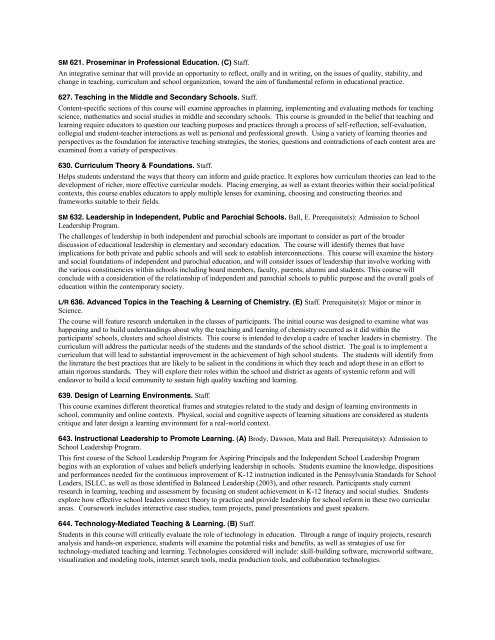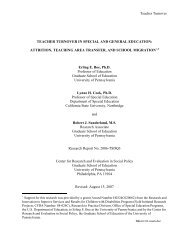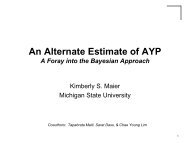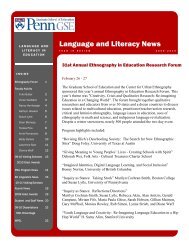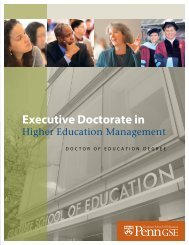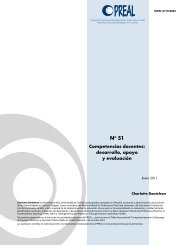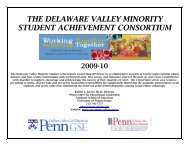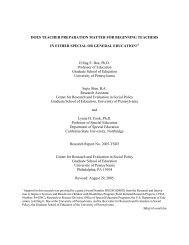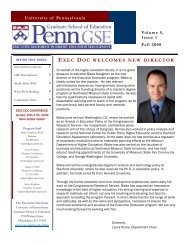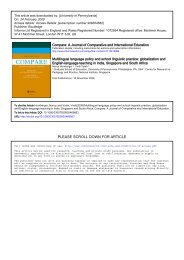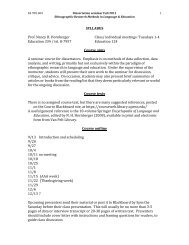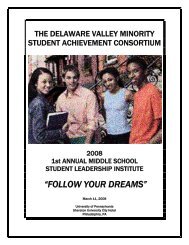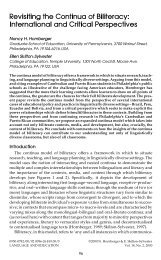EDUCATION (ED) {EDUC} - Penn GSE
EDUCATION (ED) {EDUC} - Penn GSE
EDUCATION (ED) {EDUC} - Penn GSE
You also want an ePaper? Increase the reach of your titles
YUMPU automatically turns print PDFs into web optimized ePapers that Google loves.
SM 621. Proseminar in Professional Education. (C) Staff.<br />
An integrative seminar that will provide an opportunity to reflect, orally and in writing, on the issues of quality, stability, and<br />
change in teaching, curriculum and school organization, toward the aim of fundamental reform in educational practice.<br />
627. Teaching in the Middle and Secondary Schools. Staff.<br />
Content-specific sections of this course will examine approaches in planning, implementing and evaluating methods for teaching<br />
science, mathematics and social studies in middle and secondary schools. This course is grounded in the belief that teaching and<br />
learning require educators to question our teaching purposes and practices through a process of self-reflection, self-evaluation,<br />
collegial and student-teacher interactions as well as personal and professional growth. Using a variety of learning theories and<br />
perspectives as the foundation for interactive teaching strategies, the stories, questions and contradictions of each content area are<br />
examined from a variety of perspectives.<br />
630. Curriculum Theory & Foundations. Staff.<br />
Helps students understand the ways that theory can inform and guide practice. It explores how curriculum theories can lead to the<br />
development of richer, more effective curricular models. Placing emerging, as well as extant theories within their social/political<br />
contexts, this course enables educators to apply multiple lenses for examining, choosing and constructing theories and<br />
frameworks suitable to their fields.<br />
SM 632. Leadership in Independent, Public and Parochial Schools. Ball, E. Prerequisite(s): Admission to School<br />
Leadership Program.<br />
The challenges of leadership in both independent and parochial schools are important to consider as part of the broader<br />
discussion of educational leadership in elementary and secondary education. The course will identify themes that have<br />
implications for both private and public schools and will seek to establish interconnections. This course will examine the history<br />
and social foundations of independent and parochial education, and will consider issues of leadership that involve working with<br />
the various constituencies within schools including board members, faculty, parents, alumni and students. This course will<br />
conclude with a consideration of the relationship of independent and parochial schools to public purpose and the overall goals of<br />
education within the contemporary society.<br />
L/R 636. Advanced Topics in the Teaching & Learning of Chemistry. (E) Staff. Prerequisite(s): Major or minor in<br />
Science.<br />
The course will feature research undertaken in the classes of participants. The initial course was designed to examine what was<br />
happening and to build understandings about why the teaching and learning of chemistry occurred as it did within the<br />
participants' schools, clusters and school districts. This course is intended to develop a cadre of teacher leaders in chemistry. The<br />
curriculum will address the particular needs of the students and the standards of the school district. The goal is to implement a<br />
curriculum that will lead to substantial improvement in the achievement of high school students. The students will identify from<br />
the literature the best practices that are likely to be salient in the conditions in which they teach and adopt these in an effort to<br />
attain rigorous standards. They will explore their roles within the school and district as agents of systemic reform and will<br />
endeavor to build a local community to sustain high quality teaching and learning.<br />
639. Design of Learning Environments. Staff.<br />
This course examines different theoretical frames and strategies related to the study and design of learning environments in<br />
school, community and online contexts. Physical, social and cognitive aspects of learning situations are considered as students<br />
critique and later design a learning environment for a real-world context.<br />
643. Instructional Leadership to Promote Learning. (A) Brody, Dawson, Mata and Ball. Prerequisite(s): Admission to<br />
School Leadership Program.<br />
This first course of the School Leadership Program for Aspiring Principals and the Independent School Leadership Program<br />
begins with an exploration of values and beliefs underlying leadership in schools. Students examine the knowledge, dispositions<br />
and performances needed for the continuous improvement of K-12 instruction indicated in the <strong>Penn</strong>sylvania Standards for School<br />
Leaders, ISLLC, as well as those identified in Balanced Leadership (2003), and other research. Participants study current<br />
research in learning, teaching and assessment by focusing on student achievement in K-12 literacy and social studies. Students<br />
explore how effective school leaders connect theory to practice and provide leadership for school reform in these two curricular<br />
areas. Coursework includes interactive case studies, team projects, panel presentations and guest speakers.<br />
644. Technology-Mediated Teaching & Learning. (B) Staff.<br />
Students in this course will critically evaluate the role of technology in education. Through a range of inquiry projects, research<br />
analysis and hands-on experience, students will examine the potential risks and benefits, as well as strategies of use for<br />
technology-mediated teaching and learning. Technologies considered will include: skill-building software, microworld software,<br />
visualization and modeling tools, internet search tools, media production tools, and collaboration technologies.


